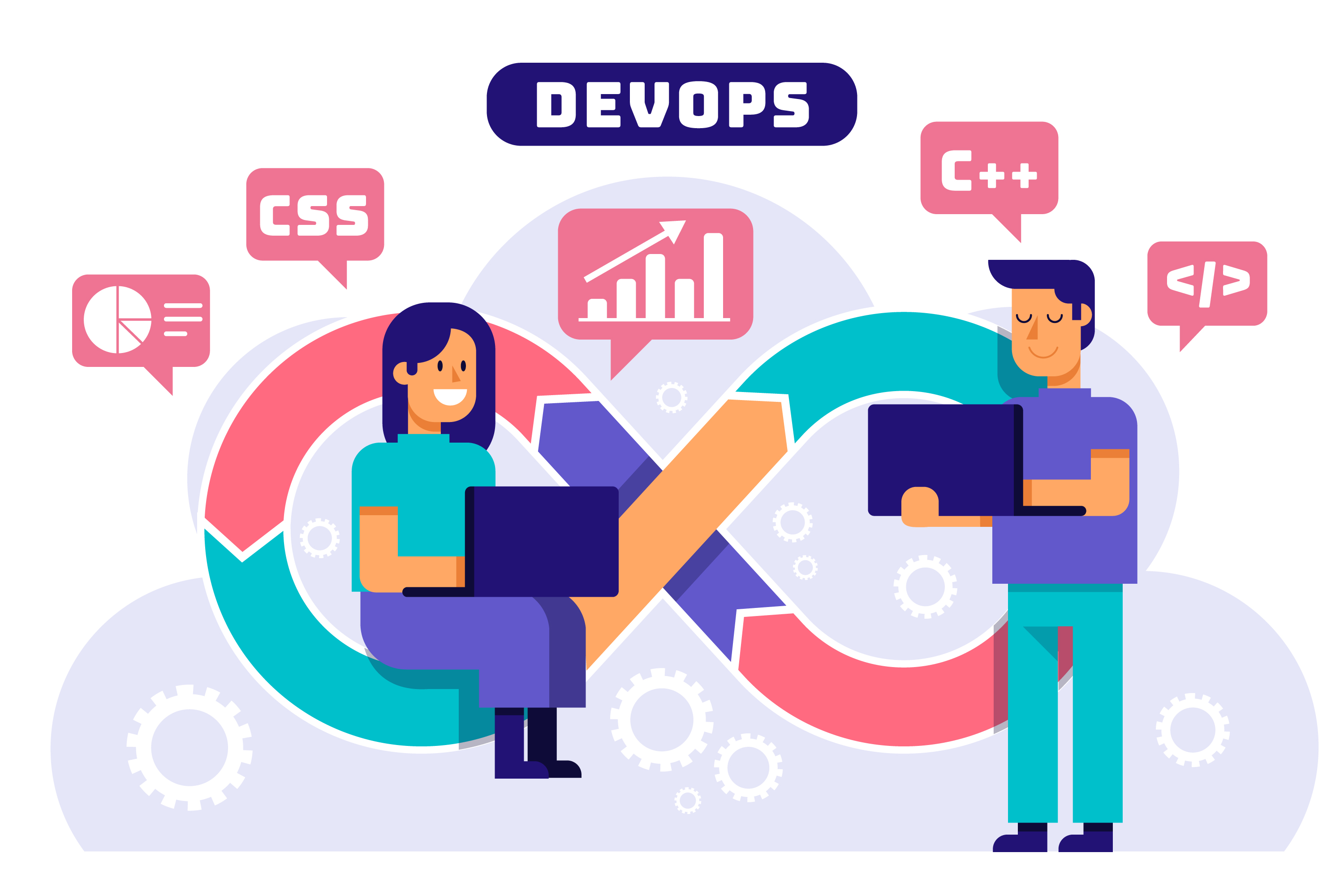
Written by - Shivam
Uploaded on - 25/05/2023
INTRODUCTION TO DEVOPS
DevOps is a software development methodology that emphasises collaboration and communication between development and operations teams to improve the speed, efficiency, and quality of software delivery. The term "DevOps" is a combination of "development" and "operations." The goal of DevOps is to create a more agile and efficient software development process, where developers and operations teams work together to deliver software faster and with higher quality. DevOps has become increasingly popular in recent years, as more companies have recognized the benefits of this approach to software development. By adopting DevOps practices, organisations can reduce costs, improve speed and efficiency, and deliver higher-quality software that better meets the needs of their customers.
ADVANTAGES OF DEVOPS
There are several advantages of DevOps that make it a popular approach to software development and delivery. Here are some of the key benefits of DevOps:
- Faster delivery: DevOps emphasises automation and continuous delivery, which allows teams to deliver software faster and more frequently. This means that new features and bug fixes can be released quickly, improving the user experience and reducing time to market.
- Improved quality: DevOps practices such as automated testing and continuous monitoring help to identify and resolve issues more quickly, resulting in higher-quality software. This can help to reduce the number of bugs and errors that end users experience.
- Better collaboration: DevOps promotes collaboration between development and operations teams, breaking down silos and encouraging communication and cooperation. This helps to improve overall team productivity and ensure that everyone is working towards the same goals.
- More efficient processes: DevOps emphasises automation and standardisation, which can help to reduce the time and effort required for repetitive tasks. This can free up teams to focus on more strategic work, improving overall efficiency.
- Greater agility: DevOps allows teams to respond more quickly to changing requirements and market conditions, as well as to experiment and innovate more easily. This can help organisations to stay ahead of the competition and adapt to new challenges.
- Overall, DevOps offers a range of benefits that can help organisations to deliver software faster, with higher quality and greater efficiency. By adopting DevOps practices, teams can work more collaboratively, respond more quickly to changes, and stay competitive in today's fast-paced software development landscape.
IS LEARNING DEVOPS WORTH IT?
Yes, learning DevOps can be a valuable investment in our career because of high demand for DevOps professionals as more organizations adopt DevOps practices, the demand for skilled professionals in this area continues to grow. It has a good salary potential. According to recent data, DevOps engineers can earn a median salary of over $100,000 per year in the United States. Learning DevOps can open up a range of career opportunities, including roles in software development, infrastructure management, and more. Learning DevOps can be a challenging and rewarding experience, helping we to develop new skills and knowledge that can benefit us both personally and professionally. Overall, learning DevOps can be a valuable investment in our career, providing we with new opportunities, competitive salaries, and the chance to work on exciting and innovative projects.
WHAT IS THE RANGE OF CAREER OPPORTUNITIES AVAILABLE IN DEVOPS?
There are a wide range of career opportunities available in DevOps, including:
- DevOps Engineer: A DevOps Engineer is responsible for the development, deployment, and maintenance of software infrastructure. They work closely with developers and operations teams to automate processes and ensure smooth deployment and operations of software applications.
- Release Manager: A Release Manager is responsible for coordinating and managing the release of software applications into production environments. They work closely with developers, operations, and other stakeholders to ensure that releases are delivered on schedule and meet quality standards.
- Cloud Engineer: A Cloud Engineer is responsible for designing, implementing, and maintaining cloud-based infrastructure and applications. They work closely with DevOps teams to ensure that cloud infrastructure is optimized for performance and security.
- Site Reliability Engineer: A Site Reliability Engineer is responsible for ensuring the reliability, availability, and performance of software applications. They work closely with DevOps teams to design and implement monitoring and alerting systems, as well as to troubleshoot and resolve issues in production environments.
- Automation Engineer: An Automation Engineer is responsible for designing, developing, and maintaining automated testing frameworks and tools. They work closely with developers and operations teams to ensure that software applications are thoroughly tested and validated before release.
- Security Engineer: A Security Engineer is responsible for ensuring the security and compliance of software applications and infrastructure. They work closely with DevOps teams to identify and mitigate security risks, as well as to implement security best practices throughout the development and deployment process.
PROGRAMMING AND OTHER LANGUAGES IN DEVOPS
Programming and other languages play a significant role in DevOps because they are the tools that automate processes and enable developers and operations teams to work collaboratively. Some programming languages and other languages commonly used in DevOps are Python, Ruby:, Bash, JSON, SQL, Javascipt. In addition to these programming languages, DevOps also requires familiarity with other languages such as markup languages (HTML, XML), configuration languages (JSON, YAML), and query languages (SQL). Understanding these languages is essential for building and deploying robust, scalable, and efficient DevOps systems.
HOW LONG DOES IT TAKE TO LEARN?
The time it takes to learn DevOps varies depending on our previous experience, our learning style, and the depth of knowledge we want to acquire. Some people may be able to learn the basics of DevOps in a few weeks, while others may take several months or even years to become proficient. In general, learning DevOps is an ongoing process, and there is always more to learn as new technologies and best practices emerge. However, with dedication and consistent effort, we can become proficient in DevOps and start applying its principles to improve software development and IT operations in our organization.
WHAT MAKES IT DIFFICULT?
Devops is a challenging field which is difficult due to following reasons:
- Cultural differences: DevOps requires collaboration and communication between different teams that have different cultures, processes, and goals. These cultural differences can create a significant challenge in implementing DevOps.
- Continuous integration and delivery: DevOps requires continuous integration and delivery, which can be a challenge due to the complexity of the systems involved, the need for continuous testing, and the need for fast deployment.
- Automation: DevOps relies heavily on automation to achieve continuous integration and delivery, but automation can be complex and require significant investment in tools and infrastructure.
- Skills gap: DevOps requires a range of skills, including development, testing, operations, and security, which can be difficult to find in a single team or individual.
- Automation Engineer: An Automation Engineer is responsible for designing, developing, and maintaining automated testing frameworks and tools. They work closely with developers and operations teams to ensure that software applications are thoroughly tested and validated before release.
- Resistance to change: DevOps requires significant changes to the way organizations work, which can be challenging for employees and leaders who are resistant to change.
- Security and compliance: DevOps requires a focus on security and compliance, which can be a significant challenge due to the complexity of the systems involved and the need to maintain compliance with regulations and standards.
IS IT A STRESSFUL JOB?
DevOps can be a stressful job at times, just like any other job in the technology industry. The nature of DevOps work involves working with complex systems, coordinating with multiple teams, and managing large-scale deployments, which can lead to high-pressure situations. Many DevOps professionals are responsible for responding to incidents outside of regular working hours. This can result in a lack of work-life balance and cause stress and burnout. The field of DevOps is constantly evolving, and professionals are expected to keep up with new tools and technologies. The need to continuously learn and adapt can add to the stress of the job.
CONCLUSION
DevOps professionals typically have a strong background in software development and IT operations, as well as experience with DevOps tools and practices.Overall, DevOps offers a wide range of career opportunities, and the demand for skilled professionals in this field is expected to continue to grow in the coming years. If we have an interest in software development, automation, and collaboration, DevOps may be a great career path for we.The complexity of DevOps, the need for collaboration, automation, and a range of skills, and the cultural and organisational challenges involved make DevOps a difficult practice to implement. However, with proper planning, training, and investment, these challenges can be overcome, and the benefits of DevOps can be realised.


